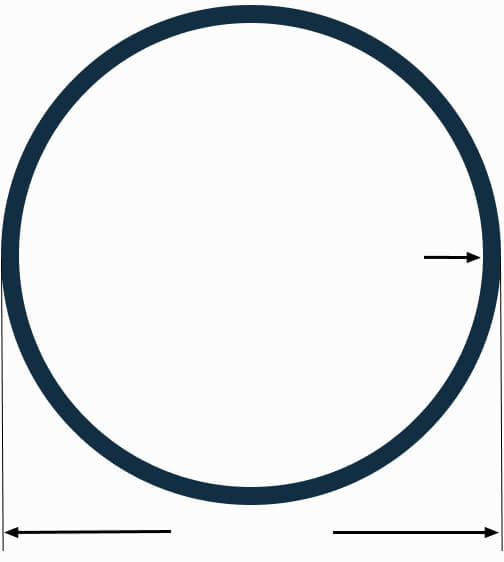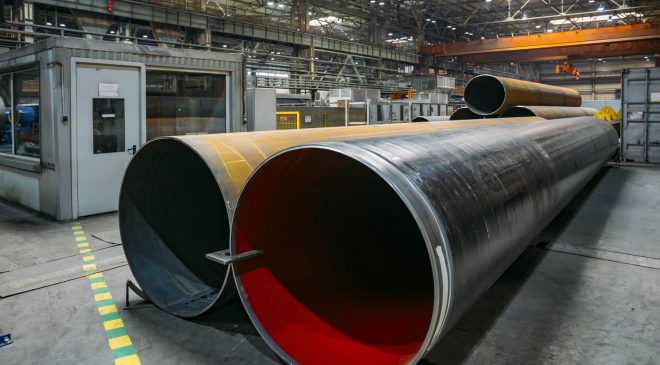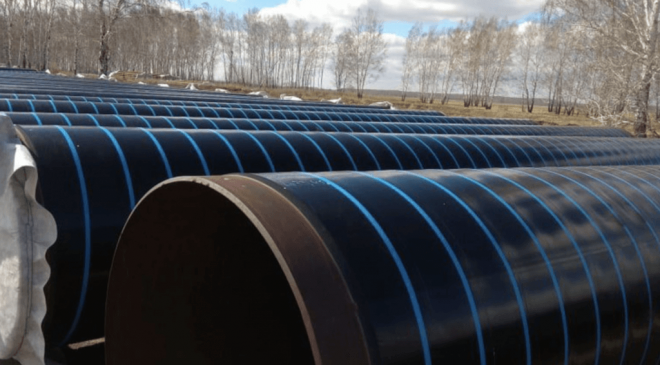Insulated steel pipes
Insulated steel pipes are perfectly suited for use in difficult conditions. Even under the influence of very high temperatures, exposure to mechanical damage or the influence of chemical agents, steel pipes in insulation can successfully function for several decades.
Due to their high resistance to corrosion, they are often used in the construction of underground pipelines. The extraordinary strength of steel pipes in insulation results from the fact that, as the name suggests, they are covered with special insulation layers.
Insulated steel pipes – characteristics
The Eco-Tech offer includes three types of steel pipes in insulation. These are steel pipes with epoxy insulation, steel pipes with polyethylene 3LPE insulation and steel pipes with polypropylene 3LPP insulation. Insulating coatings made of flexible materials ensure that steel pipes in insulation can be successfully used in projects where it is necessary to bend the pipe, without fear of damage to the insulation.
Types of insulation offered – anti-corrosion protection on pipes
- three-layer polyethylene insulation – 3LPE according to DIN 30670,
- three-layer polypropylene insulation – 3LPP according to DIN 30678,
- single-layer epoxy insulation – FBE according to DIN 30671,
- bituminous insulation: ZO-1, ZO-2, ZO-3, ZM, WM, WW,
- external insulation on 3LPE, 3LHDPE, 3LPP, and EP pipes according to DIN 30670, DIN 30672, DIN 30678, DIN 30671,
- external anti-corrosion coatings SYNERGY insulation class A50, B50, C50 Standard PN-EN 12 068:2002,
- polyurethane internal and external insulations on PROTEC pipes Execution standard PN-EN ISO 12944; PN-EN 15655:2009 and PN-EN 10290,
- internal epoxy and polyurethane paint coatings,
- internal cement coating on pipes,
- painting external and internal surfaces of pipes
Thanks to the well-chosen and made types of insulation, you will get
- high resistance to mechanical damage,
- resistance to chemical agents, moisture, electrical breakdown, exposure to high temperatures and ultraviolet rays,
- high adhesion of the insulation to the pipe surface,
- anti-corrosion protection of underground pipelines for about 50 years,
- complete protection of steel pipe welds,
- possibility of joining insulated pipes without damaging the insulation,
- the neutrality of the insulation towards the natural environment,
- adhesion to the surface of the steel pipe,
- impact resistance,
- abrasion resistance,
- resistance to indenting force, hardness and stiffness,
- unit resistance of the gas pipeline transition.
The use of steel pipes in insulation
- wastewater and post-treatment water pipelines,
- fuel pipelines in refineries and at petrol stations,
- other industrial pipelines with operating temperatures in the range of -70°C to +50°C,
- drinking water pipelines,
- industrial water and sewage pipelines,
- fuel pipelines, industrial pipelines in refineries, petrol stations and other chemical plants,
- protective pipes,
- pipelines in power plants,
- fire protection pipelines,
- chimneys,
- other industrial pipelines with operating temperatures in the range of -70oC to +600oC,
- gas pipelines,
- pipes for drilling,
- jacking pipes,
- line pipes,
- casing pipes.
We insulate steel pipes in the diameter range from 159 – 2400 m
- pipes 6-16 m long
- longitudinal seam pipes,
- spiral seam pipes,
- seamless pipes.
Our insulations meet all applicable standards, confirmed by:
- coating tightness test
- insulation certificate
- National Institute of Hygiene certificate
- certificates for insulation work
Showing 1–12 of 30 results
-

Insulated steel pipe fi 1016 x 11 mm
-

Insulated steel pipe fi 1016 x 11 mm
-

Insulated steel pipe fi 1016 x 11 mm
-

Insulated steel pipe fi 114,3 x 12,5 mm
-

Insulated steel pipe fi 114,3 x 12,5 mm
-

Insulated steel pipe fi 114,3 x 12,5 mm
-

Insulated steel pipe fi 133,9 x 10 mm
-

Insulated steel pipe fi 133,9 x 10 mm
-

Insulated steel pipe fi 133,9 x 10 mm
-

Insulated steel pipe fi 1420 x 11 mm
-

Insulated steel pipe fi 1420 x 11 mm
-

Insulated steel pipe fi 1420 x 11 mm


